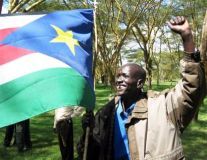Southern Sudanese wonder if nation can remain united
Aug 28, 2006 (JUBA) — The aromatic smell of sorghum and beans stirs a group of Sudanese soldiers from their lazy game of dominoes, bringing former enemies together to eat from the same tin bowl.
 Under the sweltering midday sun in barracks overlooking southern Sudan’s capital Juba, government troops crouch beside former rebels taking turns to scoop up a mouthful of steaming porridge with their fingers.
Under the sweltering midday sun in barracks overlooking southern Sudan’s capital Juba, government troops crouch beside former rebels taking turns to scoop up a mouthful of steaming porridge with their fingers.
For years, their only contact was on the thorny battlefields of the south, until a 2005 peace pact ended war between the northern Arabic-speaking Islamic government and southern guerrillas, practising Christianity and pagan rites.
The agreement, which did not address separate conflicts in the west and east, offered some hope of reconciliation in Africa’s biggest country.
But more than 18 months later, many Sudanese still wonder whether their 500 different ethnic groups using 130 languages and a variety of religious beliefs can live in harmony.
Many southerners still resent the government’s attempt to impose Islamic sharia law on them more than two decades ago, and southern nationalism is reviving.
In the barracks rising above the grassy plains of Juba, many soldiers appeared to think unity was possible, despite decades of north-south hostility.
“If someone comes to you with an outstretched hand, you welcome him even if he’s your enemy,” said Iyoub Mohammed Khatir, a 32-year-old sergeant in the Khartoum government’s Sudanese Armed Forces (SAF).
During the 21-year civil war, the town and its outlying garrison was government-held, resisting attempts by the southern rebel Sudan People’s Liberation Army (SPLA) to seize it.
The garrison now serves as the base for an integrated unit, composed in equal measure of SPLA and SAF forces.
UNITY BEFORE SEPARATION?
Fighters spoke of the possibility of friendship spurred by their weariness with a bitter war neither side could win. “If there is a funeral or wedding, both sides visit each other and share the same sadness or happiness,” Khatir said.
Sitting beside him, SPLA sergeant Peter Pandak shared Khatir’s complaints of low pay and homesickness in a town hundreds of miles from their wives and children.
“I personally feel no animosity towards northerners,” he added. “I find it easy to live together in one place.”
The unit represents the embryo of a post-war national army, created by the peace deal to defend Sudan and symbolise military unity during a six-year interim period that ends in a southern referendum on separation from the north.
Wearing an array of uniforms, chatting idly in groups, joking and playing cards, the soldiers seemed to embody the vision of unity championed by revered SPLA leader John Garang.
A year after Garang’s sudden death in a helicopter crash, his image is still emblazoned on T-shirts, framed on shop walls and reproduced in posters throughout southern Sudan.
But in the dusty streets of Juba, his dream of a “New Sudan” — where people could live side by side irrespective of race, religion, tribe or gender — is disappearing as fast as new signs of southern nationalism are emerging.
The south’s distinctive flag, a yellow star against a blue backdrop, flutters by Garang’s burial ground, and the number plates on Juba’s growing fleet of four-wheel-drive vehicles are increasingly inscribed with Roman instead of Arabic lettering.
COEXISTENCE
Deep resentment of Khartoum’s attempt to impose sharia on the south in 1983, sparking the civil war that killed 2 million people, still lingers, fuelling a desire among most southerners for independence.
“We tried unity for 50 years, but we failed. Our brothers in the north don’t respect our rights as brothers,” said trader Philip Kocwaw above the din of labourers on a building site.
“No southerner ever shared that vision of unity,” said Archbishop Paolino Lukudu Loro.
“The northerners looked at us as slaves, they wanted to Arabise us and impose Islam on us who are mainly Christian people. If you are not equal it is very difficult to coexist.”
Many northern Arab traders fled Juba after Garang’s death sparked riots and talk of assassination, but some who stayed vowed to remain even if the vote in 2011 slices Africa’s biggest country in half.
“Business is good, security is good. It is OK, it is no problem,” said Karim Ali from his darkened storeroom stacked high with bottled water and Coca Cola.
“This is my home and I am Sudanese, so I will stay.”
Local staff working at a U.N. radio station launched in July find that overcoming years of prejudice to maintain neutrality in programmes and news reports is a daily challenge. “In this country everybody is prone to be on one side or the other,” said station boss Leon Willems. “There is a long way to go.”
Broadcasting in a range of languages including classical Arabic and English, Miraya/Mirror FM’s aim is to explain the peace deal to people across the country, though Khartoum has blocked it from airing in the north.
Despite the ban, its presenters try to foster a sense of unity, playing both Arabic songs of romance and southern songs of emancipation.
“Southerners like shaking so much, so that sweat has to come out and blood has to get warm, but at a certain point they like to hear these things from Khartoum,” said radio presenter James Modi, snapping his fingers to an Arabic beat.
(Reuters)
